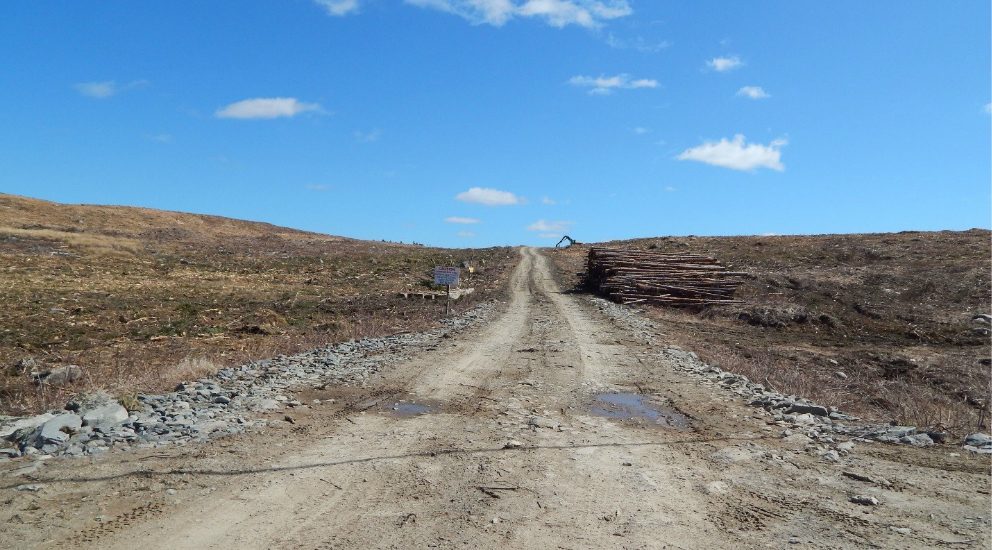
KJIPUKTUK (Halifax) – A coalition of more than 100 environmental and Indigenous groups from Canada and Europe are asking Germany to withdraw from its loan guarantee in support of a mega project to process and export natural gas in Goldboro, Guysborough County.
The German government is considering the $US 4.5 billion loan to Pieridae Energy Limited, the Calgary company behind the Goldboro project, in return for a guarantee that Germany will receive a part of the exported liquid natural gas (LNG). The Nova Scotia plant would have an export capacity of 10 million metric tons a year.
The request that Germany withdraw from the project is spearheaded by environmental groups in Alberta, Quebec, the New Brunswick Anti-Shale Gas Alliance in New Brunswick and NOFRAC in Nova Scotia. In a letter to the German ambassador to Canada these groups raise the alarm about a slew of economic, technological, legal and environmental risks associated with the project.
Andy Gheorghiu is a German-based policy advisor for Food & Water Action Europe, one of the major members of the European component of the coalition. Public knowledge of the project is not widespread in Germany, he says, but he expects that to change soon.

“The problem in a nutshell is that we are considering this LNG-based infrastructure while we are in the middle of a climate crisis and Germany cannot afford to burn any more fossil fuels,” Gheorghiu tells the Nova Scotia Advocate.
“We know that within 10 to 30 years we reach a climate tipping point, yet the Goldboro project has an economic lifespan of roughly 30 to 50 years, which is way beyond 2030. That means that by committing to Goldboro Germany either creates a fossil lock-in beyond 2030, or we face investors who will file for compensation because, with the help of our public money, we have created expectations we no longer want to meet,” says Gheorghiu.
Many in Germany consider fossil gas less environmentally harmful than coal, which currently is the third largest source of electricity in Germany, and therefore useful in its transition from coal to net-zero emissions. Georghiu argues that methane, the main component of gas, in fact has a global warming impact much higher than the government recognizes, and is definitely not the saviour its proponents suggest.
This deal with Pieridae is the start of a new gas era at a moment when we’ve run out of time for that, he says.
The letter is raising several other issues that suggest operationalizing the Goldboro project will be difficult and fraught with risks.
For one, Pieridae has consistently argued that no fracked gas will be delivered to Germany, a country that itself has banned shale gas fracking. However, the company will not be able to deliver on that promise since Pieridae’s own holdings in Alberta are insufficient, and there is no way to make up the difference without fracked gas, the letter to the German ambassador states.
The letter goes on to point to several moral issues associated with the practice of fracking, in particular in terms of climate change and “massive violations of a range of substantive and procedural human rights and the right of nature.”
The project also runs counter to the provisions of the United Nations Declaration on the Rights of Indigenous Peoples (UNDRIP) which was adopted in 2007 by a majority of 144 member states, including Germany, states the letter.
“The signing by Pieridae of a Benefits Agreement with the Indian Act Nova Scotia Mi’kmaq Chiefs does not in any way constitute compliance with the crucial UNDRIP requirement of free, prior and informed consent,” the coalition contends.
But hasn’t the German government committed to that $US 4 billion? That’s what Pieridae certainly likes to suggest.
Not so, says Gheorghiu. This is what we tried to clarify, and the only thing we have been able to establish is that there is a letter of interest, but nothing more.
Already the new coalition has proven its value, says Gheorghiu.
“I would say this coalition is already quite a success. On the one side you have these major companies with all their resources, and political decision makers. But it’s enough to have a small group of people who are willing to really dig deep and do the work to stop these projects.”
Check out this upcoming webinar on October 7 where members of the coalition will further discuss the project. The event will be simultaneously interpreted for German and English speaking audiences. Registration is required.
See also: Goldboro LNG – Not a good idea, and not just because of climate change
With a special thanks to our generous donors who make publication of the Nova Scotia Advocate possible.
Subscribe to the Nova Scotia Advocate weekly digest and never miss an article again. It’s free!



